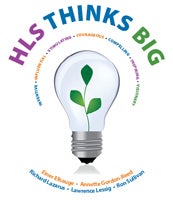“HLS Thinks Big,” inspired by the global TED (Technology, Entertainment and Design) talks and modeled after the college’s “Harvard Thinks Big” event, was held at Harvard Law School on May 23 in Austin North. During the event, five professors presented some of their favorite topics.

Einer Elhauge ’86
The promise of efforts to redesign humans and the needed limits on those efforts were the focus of a talk by Professor Einer Elhauge ’86. According to Elhauge, the law currently draws a distinction between biological interventions that treat human diseases and disabilities, and those that enhance human abilities. “It’s an important distinction because it’s a central organizing principle of our modern health care system,” said Elhauge, “but it is unsustainable in the face of growing technological development.”

Richard Lazarus ’79
Professor Richard Lazarus ’79 discussed how private-sector law firms have captured the Supreme Court’s docket, overwhelming the Court with petitions. According to Lazarus, the Court needs to create its own office of career lawyers to provide an initial layer of review, with experts capable of second-guessing and scrutinizing expert advocates.

Ronald Sullivan ’94
Clinical Professor and Director of the Harvard Criminal Justice Institute Ronald Sullivan ’94 discussed the ethical dimensions of criminal defense, questioning whether a good lawyer can be a good person. “How can a lawyer use her great education, skills and talent to secure the acquittal of a person who she knows is guilty?” he asked. Since most junior criminal defense lawyers have to resolve these sorts of conflicts on a nearly daily basis, said Sullivan, criminal law provides “a rather dramatic prism” to answer this question.

Annette Gordon-Reed ’84
Annette Gordon-Reed ’84, professor of law and history at Harvard, said it’s important for students, particularly at an institution that sees itself as training people to be leaders, to have a full grounding in history—to go through the process of thinking about how the American legal system developed—so that they can make the arguments and can think about policy when they are drafting laws.

Lawrence Lessig
Our institutions should be separate from money influence, said Professor Lawrence Lessig, director of Harvard’s Edmond J. Safra Center for Ethics. Congress has moved from dependence on the people to dependence on the funders, which jeopardizes the future of American democracy. Americans’ belief that money buys results in Congress erodes trust in the institution.
